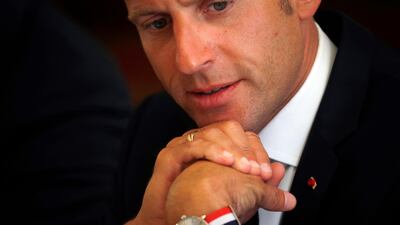France will adopt a special “halal tax” if President Emmanuel Macron accepts a major new report aimed at fighting extremism and creating an independent new body for Europe’s largest Muslim population.
Mr Macron is urged in the study by Montaigne Institut, the respected Paris-based think tank, to support a small levy on halal products, pilgrimages and donations.
The report’s author, Hakim El Karoui, a French academic and the nephew of a former Tunisian prime minister, says the proposed tax would be collected by Muslims themselves rather than the state.
Entitled The Islamist Factory, the report has gone to the Élysée Palace as Mr Macron makes final deliberations before his long-awaited announcement on the organisation of Islam in France.
It has been widely reported that Mr Macron is determined to curb foreign involvement in French Islam. He is said to favour a new body to replace existing bodies including the much-criticised French Muslim Council (CFCM), established in 2003 by a former president, Nicolas Sarkozy, when he was interior minister in Jacques Chirac’s centre-right government.
Critics say the CFCM fails to assert itself as an authoritative, fully representative voice. Even some Muslim figures see it as fragmented and inefficient.
Mr Macron wants a root-and-branch overhaul that tackles thorny issues of overseas funding and the training of imams. He has excluded the CFCM from a broad consultation process.
As well as arguing for the creation of a new Muslim Association for Islam in France (AMIF), Mr El Karoui calls for much wider teaching of Arabic in French schools.
Both ideas – and the report itself - have provoked a mixed and sometimes hostile reaction among Muslim and political leaders but will be considered by Mr Macron before he unveils his initiative, now promised for an unspecified date in the autumn.
Mr El Karoui, a former banker who served a centre-right prime minister, Jean-Pierre Raffarin, as speechwriter, says the levy would be managed by the new body, following the example of the "kosher tax" administered by French Jewish authorities.
In the conclusion to his report, he says: “French Islam, contrary to what is said, is not poor.
"It merely needs those who are impoverishing it to move away from the management of financial flows linked to it and for a healthy management to regulate the market of Islamic consumption."
This, he says, would allow the establishment of a central fund to serve the public interest: financing theological work, enabling the training of religious figures, remunerating imams and combating both anti-Muslim xenophobia and “the anti-Semitism shown by some Muslims”.
In interviews on how the scheme could work, he says AMIF would be independent of the countries of members’ origin and of mosques. It would collect a small sum on each act of Islam-related consumption, reinvesting proceeds in theological work “because it is the mother of all the battles”.
_________________________
Macron urges EU defence unity amid Trump crisis
Macron targets French welfare spending as deficit pressure rises
_________________________
Mr El Karoui warns that young Muslims in particular increasingly learn about their faith through social networks, not family or even mosques.
He says France must learn from Britain’s anti-radicalisation Prevent programme to develop an alternative Muslim narrative to counter the Salafist discourse he considers “prevalent on social networks today”.
Otherwise, he fears a “minority of Muslims in France”, regarding French society as "illicit”, will push for an alternative society with its own rules, norms and standards of behaviour. French imams, he argues, have been too weak to compete with “the strength of Salafist influencers”.
He told The National: "We have to make Muslims eager to speak up by explaining that it is their responsibility not to leave their religion to the Islamists who impose their view and rules.
“It is in their interest [to speak up] because the image of Islam in Europe is very negative due to the terrorist attacks, because of the behaviour of certain Islamists and especially their behaviour towards women.”
But his analysis was condemned on Thursday by one prominent French Muslim, Kamel Kabtane, rector of the Grand Mosque in the eastern city of Lyon, as calculated to “divide the French”.
“Taking as its pretext the fight against Islamism, this report with an uncertain outline and risky objectives shows how much its promoters, in defiance of the rules of ethics, try to discredit the Muslim community and its representatives,” he said.
He said the report was at odds with attempts by Muslim institutions, civil society and state officials to work together ahead of Mr Macron’s announcement to help Islam find its proper place in France. “For us the only fight that is worthy of fighting is against Islamism; it is the one that unites all the French in building a France that is just and fraternal,” he said.
The French mainstream right and Marine Le Pen’s far-right preferred to attack the idea of teaching Arabic in schools, with claims this would “Arabise or Islamicise” France.
But qualified and perhaps unexpected approval of a halal tax came from Ahmet Ogras, president of the CFCM. He tweeted that he was “not against a halal tax provided it is not ordered by the state”.
Mr Ogras has few reasons to look forward to Mr Macron’s initiative. A clear hint of the president’s thoughts came when he declined an invitation to attend the council’s post-Ramadan Iftar.
Addressing parliamentarians at a Versailles congress in July, Mr Macron said his government would give "a framework and rules to Islam guaranteeing that they will be exercised in accordance with the laws of the republic”.
Approached by The National, the president's press office failed to respond to questions.


